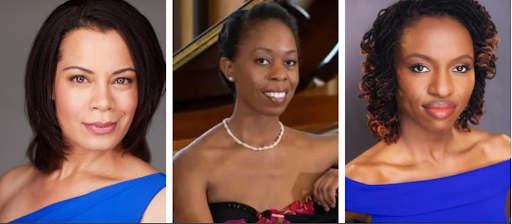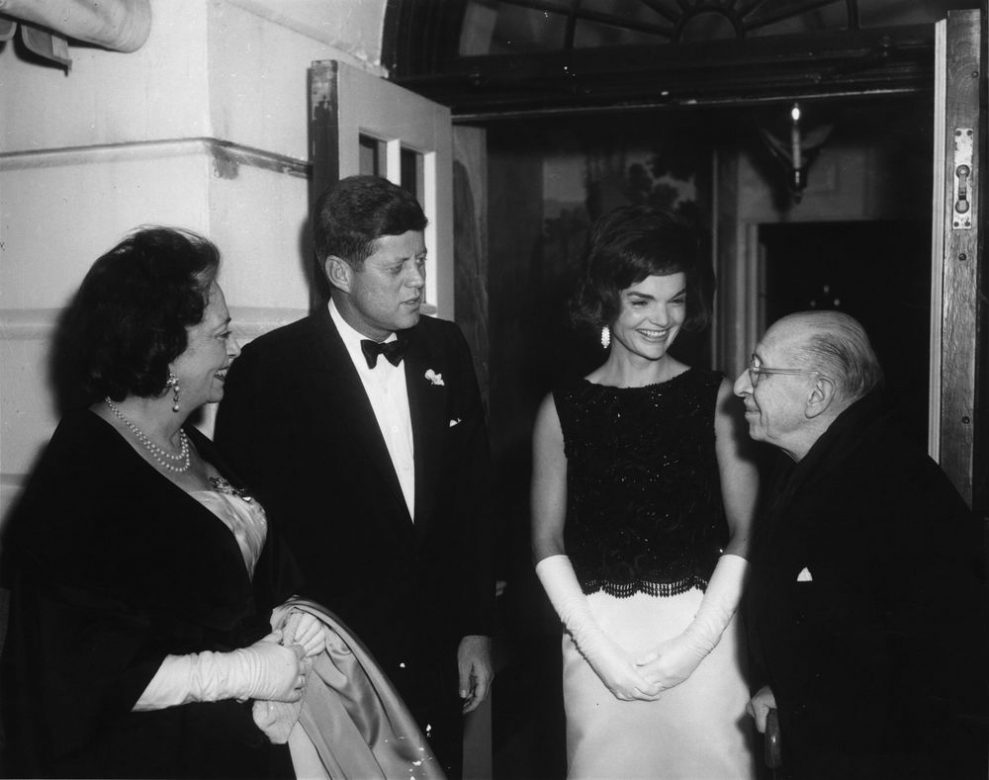by Jarrett Hoffman

•Today: SalonEra concludes Season 4 with the music of Margaret Bonds and Florence Price in “Gilded-Age Chicago”
•Announcements: honors for a trio of locals and recent grads
•Almanac: Stravinsky at the White House with JFK
HAPPENING TODAY:
Season 4 of Les Délices’ SalonEra series concludes today with “Gilded-Age Chicago.” The episode centers around the music of Margaret Bonds (“The Bells” from Spiritual Suite for piano) and Florence Price (Fantasie Nègre No. 4 in b for piano and a selection of art song: Spring, Thou’rt My Loved One, and To My Little Son) through recordings and insights from sopranos Michele Kennedy and Christine Jobson and musicologist-pianist Samantha Ege.

Left to right: Kennedy, Ege, and Jobson.
Click here to listen to the podcast version, or here to watch tonight when it premieres on YouTube at 7:30.
Also note that you can stream the entirety of SalonEra Season 4 through the end of this month.
ANNOUNCEMENTS:
Bassist Aidan Plank has been appointed to the faculty of Bowling Green State University. Plank is a member of the Cleveland Jazz Orchestra, Cleveland Jazzworks, and Dan Bruce’s Beta Collective, in addition to leading the ensemble Pulse, and is a graduate of Cleveland State and Youngstown State.
Dani Assis, who graduated last year from Oberlin Conservatory, has won the Ella Fitzgerald Jazz Vocal Competition, and is featured this month in an article in All About Jazz.
And Ava Preston, a recent graduate of Kent State’s Glauser School of Music, has won the award for Undergraduate College Outstanding Performance from DownBeat Magazine, and is featured in the publication’s Student Music Awards issue. Read here.
TODAY’S ALMANAC:
Given that today’s featured anniversar-ee is Igor Stravinsky — he was born on this date in 1882 in Saint Petersburg — we’ll focus our attention on a fascinating event at which he was the featured guest: a dinner hosted by John F. Kennedy at the White House in 1962. (Above, left to right: Vera de Bosset Stravinsky, JFK, First Lady Jacqueline Kennedy, and our Igor.)
Pettiness, chumminess, politics, charm, and drunkenness were all a part of the evening:
•Pettiness: Stravinsky considered turning down the invitation because Pablo Casals — not a fan of Stravinsky artistically, and vice versa — had been there first, having performed at the White House two months earlier.
•Chumminess: Conductor Robert Craft felt that the event was “more a Kennedy-circle dinner, with political payoffs,” than a Stravinsky dinner — something that did not escape the composer himself either (see below).
•International politics: The backdrop of the event was the Cold War, and at this point, the Russian-born Stravinsky had been an American citizen for over fifteen years. When Kennedy asked his opinion on other Russian composers, Stravinsky replied, “Mr. President, I have left Russia since 1914 . . . I have not studied or heard many of the works of these composers. I have therefore no valid opinion.” The president was pleased.
•Charm: JFK reportedly made the perfect toast to the composer: short and humorous, but also moving. One guest later commented that Stravinsky — “an amiable man, very tiny, with a manner of twinkling gravity” — responded “with immense charm.”
•Drunkenness: Stravinsky departed after only a short time at the reception following dinner. The Washington Post wrote that he was tired from rehearsals of his opera Oedipus Rex, and that he left looking “exhausted — but happy.” But in a letter written the next month, Stravinsky described the “atrocious selection of 25 people who had nothing in common with me…what are we to do at such parties other than drink. . .” And when the president’s secretary approached Stravinsky to ask how he felt, his answer was “drunk.” Given the composer’s sharp tongue when sober, leaving early was probably a good call.
Despite his general abrasiveness, Stravinsky seemed to remember the event with gratitude. And after Kennedy was assassinated in late 1963, the composer responded a year later with his twelve-tone Elegy for J.F.K., setting a text by W.H. Auden written at Stravinsky’s request. Click here to listen to a performance from March 2021 featuring mezzo-soprano Sara Sheffield accompanied by two clarinetists and one alto clarinetist from the U.S. Marine Band.





